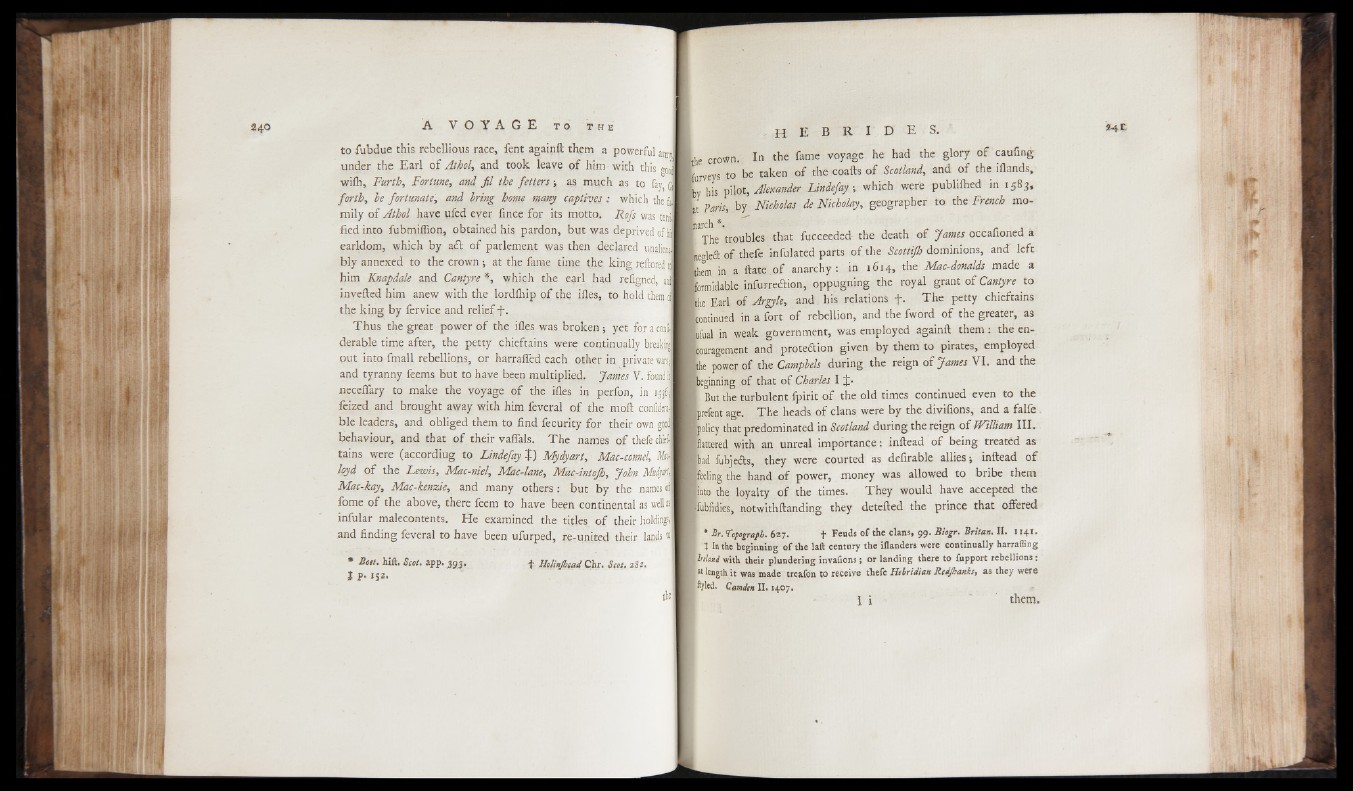
to fubdue this rebellious race, lent againft them a powerful arJ
under the Earl of Athol, and took leave of him-with this gJ
wilh, Furth, Fortune, and, fil the fetters; as much as to fay, J
forth, he fortunate, and bring home many captives : which the fj
mily of Athol have ufed ever fince for its motto. Rofs was ten]
fled into fubmiffion, obtained his pardon, but was deprived of hn
earldom, which by a£t of parlement was then declared unalienj
bly annexed to the crown; at the fame time the king refhored j
him Knapdale and Cantyre *, which the earl had refigned, an|
inverted him anew with the lordlhip of the ifles, to hold them J
the king by fervice and relief -f-.
Thus the great power of the ifles was broken; yet for a corlj
derable time after, the petty chieftains were continually breakinl
put into fmall rebellions, or harrafled each other in private wars!
and tyranny feems but to have been multiplied. James V. found |
neceffary to make the voyage o f the ifles in perfon, in 1536]
feized and brought away with him feveral o f the mod coniidmj
ble leaders, and obliged them to find fecurity for their own gooJ
behaviour, and that of their vaffals. The names o f thefe chief!
tains were (accordiug to Lindefay | ) Mydyart, Mac-connel, m
loyd o f the Lewis, Mac-niel, Mac-lane, Mac-intojh, John Malm
Mac-kay, Mac-kenzie, and many others : but by the names 01
fome o f the above, there feem to have been continental as wellasl
infular malecontents. He examined the titles o f their holding*]
and finding feveral to have been ufurped, re-united their lands »1
* Boet. hift, Scot. app. 393,
Î P* IS?*
f Holinjbead C h r . Scot, 2S2.
the
L cf0wn. In the fame voyage he had the glory o f caufing
Burveys to be taken of the coafts of Scotland, and of the ¡(lands,
I his pilot, Alexander Lindefay; which were publiihed in 1583,
Lt Paris, by Nicholas de Nicholay, geographer to the French molarch
1 r
I The troubles that fucceeded the death o f James occalioned a
leglea of thefe infulated parts of the Scottijh dominions, and left
■hem in a ftate of anarchy: in 1614, the Mac-donalds made a
■formidable infurredtion, oppugning the royal grant of Cantyre to
Ihe Earl of Argyle, and. his relations !gj The petty chieftains
Continued in a fort of rebellion, and the fword o f the greater, as
■dual in weak government, was employed againft them: the en-
■couragement and protection given by them to pirates, employed
Khe power of the Campbels during the reign of James VI. and the
Beginning of that of Charles I jl-
I But the turbulent fpirit of the old times continued even to the
■prefent age. The heads of clans were by the divifions, and a falfe
policy that predominated in Scotland during the reign of TFilliam III.
Battered with an unreal importance: inftead of being treated as
Bad fubjefts, they were courted as defirable allies; inftead of
■feeling the hand of power, money was allowed to bribe them
■into the loyalty of the times. They would have accepted the
■fublidies, notwithstanding they detefted the prince that offered
I * Br. topograph. 627. + Feuds of the clans, 99. Biogr. Britan. II. 1141.
I t In the beginning of the laft centnry the iflanders were continually harrafling
Birf/asrf with their plundering invafions; or landing there to fupport rebellions:
at length it was made treafon to receive thefe Hebridian Red/banks, as they were
■%led. Camden II. 1407.
I i ' them.